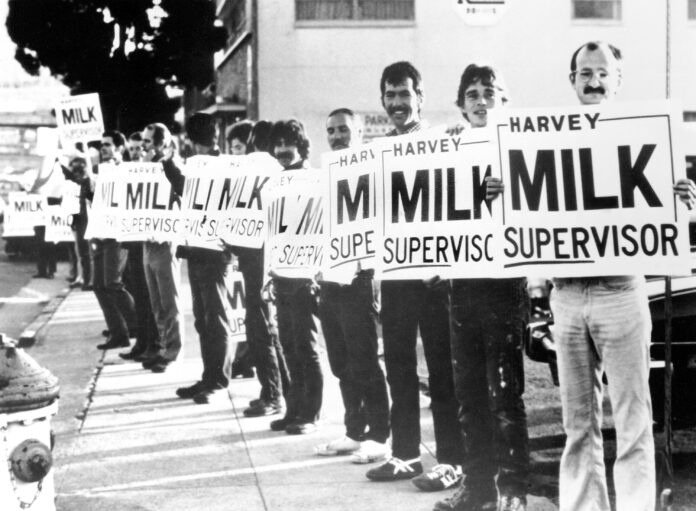The Lightbox Film Center is celebrating “Pioneers of Queer Cinema” with six features and a shorts program screening from October 19 through November 5. The films, are of which all classics, include Arthur Dong’s 1994 documentary, “Coming Out Under Fire,” (October 20 at 7:00 pm) about gays in the military during WWII; Tom Joslin’s experimental film about identity, “Blackstar: Autobiography of a Close Friend” (October 27, 7:00 pm); and a shorts program (November 5, 5:00 pm), that features several shorts including the Oscar-winning “Trevor”
Here are four personal favorites screening in the series.
In 1996, Cheryl Dunye broke queer cinema ground with “The Watermelon Woman” (October 19 at 8:00 pm). She was the first out African American lesbian filmmaker to direct — as well as write, edit and star in — a feature film. This scrappy independent film, set and shot in Philadelphia has Cheryl (Dunye), a video store clerk and budding filmmaker, fascinated by the (fictional) African American actress Fae “The Watermelon Woman” Richards (Lisa Marie Bronson). Cheryl seeing Fae play a mammy role in “Plantation Memories,” a film from the 1930s, and starts a video documentary project investigating Fae’s history because “black women’s stories have not been told.” In the process, she makes some startling discoveries about Fae’s life, work, and relationships as well as her own.
“The Watermelon Woman” is an episodic film that is both fun and provocative. The loosely structured narrative creates multiple layers of meaning as Dunye incorporates photographs and archival film footage to performance videos to on-the-street interviews (look fast for PGN’s Suzi Nash), to a film-within-a-film. There is also a compelling love story in Cheryl’s relationship with Diana (Guinevere Turner), a white customer at the video store. But it is the way Dunye addresses issues of race, gender, and sexuality that make “The Watermelon Woman” so gratifying. The various narratives and approaches do connect, and Dunye makes a cogent point that sometimes we have to search deeper into our own history, and sometimes we have to create it ourselves — as she had done.
“The Times of Harvey Milk” (October 28, 7:00 pm) is director Rob Epstein’s galvanizing, Oscar-winning documentary portrait of Harvey Milk, the first openly gay man to be elected to public office when he won a campaign for a seat on the Board of Supervisors in San Francisco (its city council). Milk, along with Mayor George Moscone, was assassinated in office by Dan White, a former city supervisor. Epstein recounts Milk’s life and career using photographs, archival footage and news reports, along with moving testimonies by his friends and allies. The film is inspirational as it explains how Milk gave LGBTQ people a voice. His grassroots efforts to stop Proposition 6, a bill that would deny gay people jobs as schoolteachers, was a decisive victory and shows how he moved the needle not just for his community but for everyone. As the film presents White’s trial and the demonstrations that followed, it shows how trailblazing Harvey Milk was and how important his legacy is today
Also screening in this program is Arthur J. Bressan Jr.’s documentary short, “Coming Out,” filmed at the 1977 San Francisco (Pride) Parade.
“Word Is Out” (November 4 at 7:00 pm) is a trailblazing documentary featuring poignant, emotionally charged interviews with a cross-section of 26 members of the queer community who only had sexual orientation in common. The film was made to “break stereotypes and make gay ‘universal.’ Gay is not just a white male thing. There are gradations,” according to co-director Andrew Brown. He and his fellow filmmakers, Nancy Adair and Rob Epstein among them, made the film, “To help change laws. There was talk about a movement that tried to suppress the gay movement. And campaigns to stop gay teachers from teaching.”
Two of the subjects featured in “Word is Out” were filmed in Philadelphia: Michael Mintz, an outspoken Princeton student who had been attacked on campus, and Donald Hackett, a married man who lived in West Philly and did not identify with gay culture.
“Parting Glances” (November 5, 8:00 pm) is the late Bill Sherwood’s outstanding 1986 film about a day in the life of two lovers and their friends. Michael (Richard Ganoung) and Robert (John Bolger) have been together six years, when Robert has been assigned abroad for work. As they attend a dinner party with his boss, and a party given by their friend Joan (Kathy Kinney) they confront a crisis in their relationship. Despite being a film about a couple separating, scenes of the lovers kissing and being affectionate with each other are especially sweet. The performances by the two handsome actors are engaging, and the actors have a nice on-screen chemistry together.“Parting Glances” also features an adorable young student, Peter (Adam Nathan) developing a crush on Michael, and his efforts to woo the film’s lovelorn hero. Yet Michael is more interested in caring for his best friend Nick (Steve Buscemi in his screen debut) who is dying from AIDS. Sherwood was the one of the first writer-directors to address the issue of AIDS, and his winning, low-budget film is still notable for its depiction of the disease on the community.
